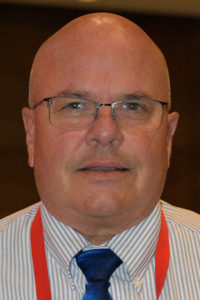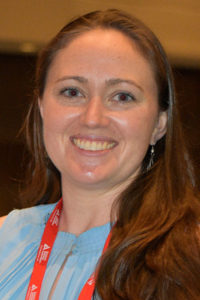
From going off to college to entering the workforce, the transition to adulthood can be an anxious and stressful time, particularly for adolescents and young adults managing a chronic health condition. The session Individualizing Diabetes Care and Education for Children, Teens, and Young Adults with Diabetes on Monday, June 6, featured a panel of experts who talked about how health care professionals can support young people with diabetes during this challenging time in their lives.
The session was livestreamed and can be viewed on-demand by registered meeting attendees at ADA2022.org. If you haven’t registered for the 82nd Scientific Sessions, register today to access the valuable meeting content.
Paul McGuigan, RN, CDCES, Study Coordinator at Case Western Reserve University, University Hospitals Cleveland Medical Center, discussed the challenges faced by young people with type 2 diabetes and the importance of education for them, their families, and caregivers.
Health care professionals creating a continuum of care and support is key to supporting and educating young people to successfully manage their diabetes, he said.
“We diagnose these patients, treat them, provide them education, and send them home. Way too often, we never see them again, and if we do, it is when they are presenting with complications,” McGuigan said. “Many are asymptomatic when diagnosed, and loss to follow-up minimizes the seriousness of the disease for these young patients who are at high risk for long-term complications.”
Because youth-onset type 2 diabetes is a relatively new phenomenon, little has been published on how to educate these patients and their families, he said, cautioning that reliance on methods and models of education developed for children with type 1 diabetes or adults with type 2 diabetes may not be the best practice.

“Educational materials need to be tailored to this specific audience, especially with regard to activity and dietary needs and multigenerational interventions, and the lessons need to continue as the children mature into young adulthood,” McGuigan said. “Trust and respect are key to any ongoing educational endeavor and, as educators, we need to think broadly and consider ethnic and community diversity in educating children and families with youth-onset type 2 diabetes.”
Christina L. Roth, CEO and Founder of the College Diabetes Network (CDN), discussed the challenges of going away to college for young people with diabetes and resources available to help them successfully make the transition.
“College is really the perfect storm of diabetes and young adulthood,” Roth said. “It represents a distinct period of time when a young adult, often for the first time in their life, is isolated geographically from their social support system. It introduces so many of the risks and the triggers with diabetes that are seen throughout young adulthood, and it is all compounded by the experience, the excitement, the stress, and the uncertainty that embodies this time in life.”
She said it is important for health care providers to prepare and educate their young patients on the challenges they may face and how to successfully—and independently—manage their diabetes.
“The No. 1 thing is to start the conversation early, ideally when your patient first enters high school or really starts looking at any type of independent management. It’s a process and it takes time—it won’t just happen in one visit,” Roth said.

For support and resources, she said young people can look for a CDN on their campus and download helpful guides and other materials from the CDN website.
Julia E. Blanchette, PhD, RN, BC-ADM, CDCES, Nurse Scientist and Clinical Assistant Professor at University Hospitals Cleveland Medical Center and Case Western Reserve University, talked about health insurance literacy and the financial stress young people can experience during their transition to adulthood.
“The cost of diabetes is a hot topic right now, and it dramatically impacts emerging adults who are learning to balance personal and diabetes-related finances and navigate all of the complexities of the health care system,” she said.
Understanding how health insurance and personal finance works can transform glycemic outcomes, as well as quality of life, she said. To that end, Dr. Blanchette developed and tested a novel, peer-led financial literacy program, the T1 Financial Toolkit, for young adults with type 1 diabetes.
“This is an exciting new resource that you, as a clinician, can add to your toolkit to provide practical financial education in ways that are tailored to the needs of young adults and their real-life experiences,” she said. “This is the kind of education that can change peoples’ lives.”
[sub-post-content]